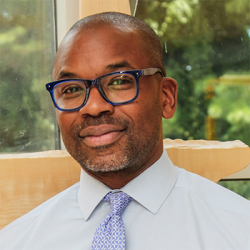
I love this time of year! Summer is ending and it’s time to embrace the fall—cooler weather, less pollen in the air, my countdown to football season… But, what I love most about this time of year is the start of school. As an educator for 21 years I’m always excited about the new possibilities the school year brings. I recall my own days as a teacher, welcoming my students and giving them a sense of belonging, spending countless hours designing a physical space that met their needs. But who, I wonder, meets the needs and wants of the teachers?
Sharing and Acknowledging Teachers' Needs:
As a Lead National Faculty Member with PBLWorks, I have the ongoing opportunity and honor of collaborating with teachers across the country. Our time together often prompts deep and meaningful conversations about their everyday needs/wants. This year I invite others who regularly support teachers to reflect on these conversations alongside me, serving them in the following areas:
- Respect
- Time
- Resources
- Autonomy
RESPECT
Aretha Franklin stated it best: “R-E-S-P-E-C-T. Find out what it means to me!” Through my involvement with educators, I hear firsthand what respect means to them. They desire respect as the professionals they are. Teachers are included in a wide range of professions overseen by government standards. Their original and ongoing training must meet high standards, just like a doctor or lawyer, both highly respected professions.Most teachers spend 4 – 5 years earning their initial degree and professional credentials to teach. On top of that, many often seek additional degrees and certifications to grow, elevate their practice, and pursue opportunities within the field. Ask any teacher and they will tell you that professional development is an ongoing process, averaging 20 – 30 hours a year.
Despite consistently wrestling with the tension of doing what’s best for their students, managing others’ responses, and implementing what’s mandated, teachers are still not always given the respect they deserve. But what can school leaders do to serve teachers’ need for respect?
- Invite teachers into the spaces where decisions are made. Create policies and procedures with the input of classroom teachers.
- Listen to understand. Gather insight by asking how and why they implement their practices.
TIME
Time is something we can never get back once it is gone, and teachers are always pressed for time. They need time to grade papers, meet with parents, attend professional development, and plan lessons. Without it, teachers are limited when exploring new ideas, practices, and strategies to boost student performance. Too often we do not honor these time constraints. But, there are multiple strategies to value teachers’ time.
- Consider setting protocols in meetings to build a structured environment, both freeing up time and allowing effective, meaningful conversations.
- Encourage and model boundaries with work: don’t answer emails after 5 pm, use the weekend to disconnect from work, and promote outside interests that create balance.
- Introduce the concept of Found Time. Not every meeting needs to last the scheduled duration. Sometimes, a meeting can even be an email. Trust teachers to use the time you give them wisely.
RESOURCES
Teachers need access to financial and professional resources to help them execute the lessons and units they are developing. I remember spending hundreds of dollars on my classroom and students. Many teachers can say the same (which should be an exception, not the norm). Another general need is resources beyond professional development. Teachers sometimes find themselves in a situation where they attend a PD that doesn’t connect to their curriculum at all. Or, they don’t receive ongoing coaching to help them implement a new approach or strategy. It is vital to find ways to provide both financial and professional resources.
- Clearly state what financial resources are available and how to access them.
- Allow teachers to coach and be coached. Provide follow-up opportunities from professional development facilitators.
AUTONOMY
At my core, I believe that every teacher wants to see their students succeed in their class and in life. I trust they make decisions to have the greatest positive impact on students possible, and they need autonomy to do so. As lifelong learners, teachers want to apply new information into the classroom experience that will engage their students in an ever-changing world. But when facilitating workshops I hear common concerns: How will this practice fit into my curriculum? How will my administrator evaluate me if I do something differently? What if a student’s parent gets upset? So, how can we support teachers’ autonomy in engaging students in new ways?
- Create open lines of communication where teachers can openly share their thinking with school leaders.
- Allow teachers to embark on their own development adventure, creating time and space for teachers to make curriculum adjustments.
- Trust teachers and their ability to do their jobs well. Build a culture where they share the classroom experience with other teachers, staff, and parents.
This school year, let’s remember the true heroes of our education system: our dedicated teachers. They possess a passion for nurturing young minds, but too often their profound needs and wants aren’t met. Respect, that fundamental acknowledgment of their professionalism, time to craft innovative lessons, access to essential resources, and the autonomy to tailor their teaching methods all contribute to their ability to create engaging, transformative classroom experiences. As we prepare to support a new generation of learners, let us also commit to supporting the tireless educators who shape their future and ignite joy, for they are the true architects of learning experiences.

